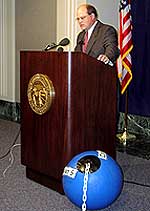By Elizabeth Stawicki
Minnesota Public Radio
June 27, 2002
The U.S. Supreme Court has struck down Minnesota's rule that limits what judicial candidates may say during their election campaigns. By a vote of 5-4, the high court said the state's well-intentioned ethics rule imposed an unconstitutional gag order. That rule banned judicial candidates from announcing their views on political and legal issues likely to come before the court.
| |
|
|
|
||
Writing for the majority, Justice Antonin Scalia said the First Amendment does not permit Minnesota to have elections while preventing candidates from discussing what the elections are about.
The ruling is a victory for Golden Valley attorney Greg Wersal, who along with the state's Republican Party, argued the ethics rule muzzled free speech. Wersal - who once campaigned for State Supreme Court chained to a blue ball that symbolized the speech limits - appeared at a press conference after the ruling with the same ball, this time untethered.
"With this decision of the U.S. Supreme Court, we have now restored free and open judicial elections to the state of Minnesota," Wersal said.
The high court's split position fell largely along ideological lines, with conservative justices Scalia, Rehnquist, Kennedy and Thomas striking down the rule, and liberals Breyer, Souter, Stevens and Ginsberg dissenting.
Justice Sandra Day O'Connor, sometimes viewed as the swing vote, lined up with the conservatives on this case. The ruling is a change in course for the court, which has been loathe to tell states what to do.
Justice Stevens reminded the court of that in his dissent. He said the First Amendment does not command states who exercise their sovereignty to abandon their own systems of judicial selection.
| |
|
|
|
||
The Head of the board that investigates attorney misconduct, Ed Cleary, says the ruling means a major change for Minnesota's upcoming judicial elections.
"I think people are going to have to get used to the idea now that lawyers who run for judicial office are going to be able to speak very openly about a lot of hot-button issues," Cleary says. "That concern is going to be that they will be putting themselves in a position that may compromise their ability to be impartial once they're on the bench."
The ruling will affect at least 39 states which have restricted judicial speech to some degree. Studies have shown that in states without restrictions, single interest groups and political parties have spent record amounts of money on supreme court races.
Legal scholar Deborah Goldberg of New York University law school's Brennan Center co-authored a study that found the flow of money into judicial races more than doubled from 1998 to 2000. She called the court's ruling on judicial speech unfortunate.
"It's likely to exacerbate the trend that we saw in the 2000 cycle, with increasing spending in judicial campaigns and decreasing civility in judicial campaigns," Goldberg says.
|
"It's likely to exacerbate the trend that we saw in the 2000 cycle, with increasing spending in judicial campaigns and decreasing civility in judicial campaigns."
- Legal scholar Deborah Goldberg |
Some Minnesota judges who asked not to be named have said Wersal and the Republican Party's challenge was rooted in an attempt to inject issues like abortion into judicial campaigns. Greg Wersal and his attorney Bill Mohrman said no abortion groups funded the case, but the abortion issue did play a role in spurring the challenge.
"I don't think there's any question that groups such as pro-life activists - whose goals have are being thwarted primarily through the judicial system - will be very happy with today's ruling. That's what they want," Mohrman said.
Groups on the other side of the abortion fence are planning to wade into judicial campaigns. Tim Stanley of the National Abortion Rights Action League says now that the rules have changed, his organization will work to ensure that judicial candidates in Minnesota support legalized abortion.
"It basically will end up perhaps increasing the number of races that we need to work in by about 50 percent. And the ones we need to work on regarding candidate recruitment, as well as honestly campaigning now in judicial races," says Stanley.
Probably the person most affected by the rule change is Minnesota Supreme Court Associate Justice Paul Anderson, who's the only justice on the court running for re-election this fall. Anderson says the landscape has changed, but he won't prejudge cases or make pledges that would compromise his ability to decide cases fairly.
"I've always had this absolute deep commitment that anybody coming to a court in Minnesota is entitled to a fair hearing. Sometimes perception and reality blend, and I'm not going to do anything that undermines the perception and reality that someone will get a fair hearing," says Anderson.
Throughout the past several years, Greg Wersal has said the ethics rule barred him from speaking his mind on legal and political issues. But now that the court has lifted those limits, Wersal still won't talk about his personal opinions. He says that's irrelevant now since he is not a judicial candidate. But Wersal says he's not ruling out another campaign for a seat on the bench.
More from MPRMore Information


